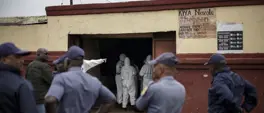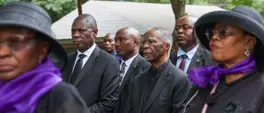Waiting for dignity: Disabled workers starving for meds they need to survive
Palesa Manaleng
28 November 2023 | 12:00Dr Virginia Wilson contacted Eyewitness News after months of battling the Compensation Fund when she found out her patients weren’t receiving their much-needed medication.
JOHANNESBURG – “I’ve been struggling to get my medication for a while now, and there is never a clear explanation as to why it hasn’t come.”
Thabo Sithole (not his real name), who worked as a security guard for a company before he was shot while on duty during an armed robbery, is a T10/T11 paraplegic.
He is one of many disabled people injured at work who depend on the Compensation Fund (CF). The CF’s main objective is to provide compensation for disability, illness, and death resulting from occupational injuries and diseases.
But for unknown reasons along the way, Sithole and a group of people with disabilities, who are currently under the care of Dr Virginia Wilson, have been struggling to access their medication.
“Most of my patients are manual labourers or drivers whose families don’t have the means to spend R4,500 to R5,000 monthly on medication. This is what they will need to try to raise to be able to live, to have some dignity while waiting for CF to pay for their meds,” said Wilson.
Wilson is a general practitioner with a special interest in physical and rehabilitation medicine and has over the years taken care of countless individuals in their recovery after sustaining injuries in the workplace.
“It is a role that has not only defined my professional life but has allowed me to witness the extraordinary resilience of the human spirit. Yet in the midst of this profound journey, shadows have been cast by an all-too-common triad: poor communication, ineptitude, and a disheartening reluctance to strive for improvement.”
COMPENSATION FUND ALARM BELLS
Wilson contacted Eyewitness News after months of battling the Compensation Fund when she found out her patients weren’t receiving their much-needed medication.
Upon investigation, she found out that the CF was not paying Medipost, the pharmacy contracted to disperse patient medication. At some point, the CF terminated the Medipost contract, but failed to inform healthcare providers, caregivers, or patients, Wilson said.
“In late 2022, the first alarm bells rang when some CF patients under my care started experiencing disruptions in their regular medication and supply deliveries. November saw authorisation delays, leaving some spinal injury patients without the vital resources they needed for their daily lives. By the beginning of 2023, many patients had not received regular delivery of medication and supplies, in certain instances, this had been happening for as long as two months,” she explained.
She told Eyewitness News that no formal communication was extended to patients, caregivers, or healthcare providers regarding the cancellation in 2022 of the agreement with Medipost. This lack of transparency and communication from the CF threw the lives of many into chaos, suddenly cutting off pain relief and critical supplies for bladder and bowel continence.
“Discontinuation of specific medications should never be abrupt. This principle particularly holds true for drugs commonly used to alleviate muscle spasms and neuropathic pain. For instance, the sudden cessation of Baclofen can potentially trigger severe consequences, including the exacerbation of spasticity, the onset of hallucinations, and even convulsions. Likewise, when dealing with centrally acting medications like Pregabalin and Gabapentin, it is advised to adhere to a gradual withdrawal approach.”
‘NEEDLESS SUFFERING’
In April 2023, the Compensation Fund went back to Medipost. However, Wilson feels the damage had already been done.
“Patients, including those in full-time care and hospice settings, had been exposed to needless suffering, health risks and complications, pain, and anxiety due to the absence of medication and supplies.
“Designed to serve as a lifeline and a safety net for those injured in the line of duty, the CF is meant to ensure that employees receive the care, financial support, and long-term medical support for those with permanent disabilities they rightfully deserve to rebuild their lives. Yet, in the folds of this noble mandate, there is a thread that challenges the very essence of compassion and responsibility.”
COMPENSATION FUND RESPONDS
Eyewitness News contacted the doctors that Wilson had been communicating with from the Compensation Fund on 30 August via e-mail about the non-payment. A response from a Dr Vuyiswa Mabudusha was received, stating that the Compensation Fund had not stopped paying Medipost.
“The Compensation Fund has not stopped paying Medipost. The issue has long been resolved.”
Mabudusha further said that, contrary to testimonies from Wilson and those awaiting medication, “patients were informed when they enquired about their medication that medication will be delivered.”
Eyewitness News also asked whether doctors at the Compensation Fund understood the health implications to paraplegics and quadriplegics, or those who have suffered brain injuries, if they did not receive their medication.
“Health implications will depend on the condition of the patient, the type of medication they are receiving, and the duration that they would not have received medications,” Mabudusha said.
The Compensation Fund stood firm that they had done what was needed. Wilson, however, disagreed, questioning whether someone had to die in order for things to change.
“Amidst this journey, there unfortunately remained some turbulent waters ahead for these vulnerable patients caused by ongoing lapses in communication by the CF, scripts not provided to the pharmacy, and several outstanding authorisations. At a hospice in Hursthill, Johannesburg, where I care for three CF patients, the deliveries swung erratically, with one individual enduring a medication hiatus from May to August,” Wilson lamented.
Eyewitness News contacted the Compensation Fund again in November to ask whether they could prove otherwise. No communication was received by the time of publication.
According to the South African Human Rights Commission, disability is one of the seven focus areas identified by its mandate to promote, protect, and monitor the realisation of human rights in South Africa.
The question by those affected remains: Are the events that transpired involving the Compensation Fund infringing on the rights and dignity of these patients?
Get the whole picture 💡
Take a look at the topic timeline for all related articles.













